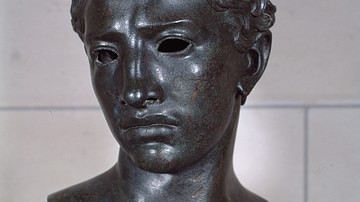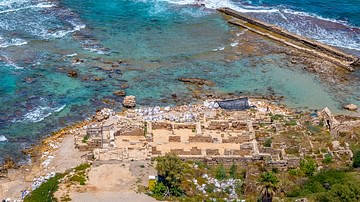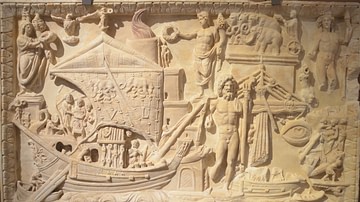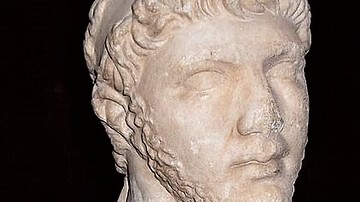
Caesarea was actually the name of three separate cities: one in Palestine, one in Cappadocia (Asia Minor), and one in Mauretania, present-day Algeria. The first city, Caesarea Maritima, was built by Herod around 25 BCE and, like the other two cities, was named for Roman emperor Augustus (r. 27 BCE to 14 CE). It served as an administrative capital for the province, and in the 1st century CE, Emperor Vespasian (r. 69-79 CE) made it a colonia. The city would later become the capital of Judea.
The second city, Caesarea Cappadocia was captured by Alexander the Great on his quest to conquer the Persian Empire. It was made a province in 17 CE by Emperor Tiberius (r. 14-37 CE). Lastly, originally named Iol, Caesarea Mauretania lay along the northern coast of Africa near the present-day city of Algiers.
Juba II
Caesarea Mauretania was originally founded by the Phoenicians in the 5th century BCE to serve as a trading station. During the 3rd century BCE, due to its strategic location, new defenses were built, and in 33 BCE Rome annexed the area, placing it in the hands of a Nubian prince named Juba II. Although his father was once an ally of Pompey, Juba had lived in Rome under the tutelage of Julius Caesar, learning to read and write Greek and Latin. As he was considered too Roman to rule, Juba and his wife, Cleopatra Selene II (the daughter of Mark Antony and Cleopatra VII), were at the mercy of civil unrest when Emperor Augustus intervened. Juba made the city into a typical Graeco-Roman city, complete with street grids, a theatre, an art collection, and a lighthouse similar to the one at Alexandria. It was Juba who named the city Caesarea after Augustus.
Later History
Considered to be one of the more loyal provinces, Caesarea Mauretania began to grow under Roman rule, eventually reaching a population of over 20,000. In 44 CE during the reign of Emperor Claudius (r. 41-54 CE), it became the capital of the imperial province of Mauretania Caesarensis. Later, the emperor made it a colonia, Colonia Claudia Caesarea. As with many other cities throughout the Roman Empire, he and his followers further Romanized the area, building monuments, enlarging the bathhouses, adding an amphitheater, and improving the aqueducts. Later, under the Severan Dynasty, a new Roman forum was added. Although it would recover, the city was sacked by Moors during a revolt in 371/372 CE. The area was finally overtaken by the Vandals in 429 CE, however, in 533 CE the city was seized by the Byzantine emperor Justinian (r. 527-565 CE). Earthquakes have since ravaged many of the ancient remains.







